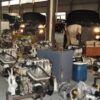Business
Igbo Apprenticeship System: A Case Study Of Sir Louis Phillip Ojukwu
Igbos who are predominantly from the South Eastern part of Nigeria are inherently entrepreneurs. There are countless records of business tycoon from the Igbo origin, both from the past and present.
Igbos are hardworking; they have this ingenuity in them to turn anything they lay their hands on to gold.
Another amazing thing Igbos have been doing in making sure their successes sustainably extend to their family members, extended families, kinsmen and tribesmen is by bringing them into their successful endeavors and teaching them the principles of success, especially as it’s peculiar to the businesses they’re into, including the necessary skills.
In doing this, agreements are reached between the business owner(boss) and the family of the person(apprentice) who is to learn the business or handwork.
This arrangement is what is called the IGBO APPRENTICESHIP SYSTEM (ỊGBA BỌỊ)
The Igbo Apprenticeship System has produced a lot of billionaires and millionaires in Igboland. The practice has over the decades contributed immensely to human capital development in AlaIgbo. It has also helped in wealth distribution.
The Igbo Apprenticeship System has been said to be the biggest business incubator in the world and to also have produced more millionaires and billionaires more than all the universities in Nigeria.
The oldest popular and precise record of Igbo Apprenticeship System was during the time of Late Sir Louis Phillip Ojukwu, the billionaire father of Late Sir Chukwuemeka Odumegwu Emeka Ojukwu from Nnewi, Anambra State.
Sir Louis Ojukwu was indeed an outstanding business mogul. He was the first billionaire in Africa. Sir Louis did exploits in so many businesses like transportation as he founded Ojukwu Transport Company, the biggest transportation company during his time. He also owned Ojukwu Stores, Ojukwu Textile etc.
Sir Louis Ojukwu was the founder of Lagos Stock Exchange which later became Nigeria Stock Exchange. He was a board member of over thirteen (13) multinational companies in Nigeria. It was also him that Nigerian government borrowed his Rolls Royce with which they drove the Queen Elizabeth of England around in 1956, when she visited Nigeria.
Sir Louis Ojukwu was that big!
In all these his business exploits, especially in transportation, Sir Louis made sure he nurtured people in his line of business too, especially in the transportation sector.
At the peak of his transportation business, notable names like Chief Augustine E. Ilodibe popularly known as Ekenedilichukwu Transport from Nnewi was one of his drivers.
Chief Ubajaka who also later founded the popular Izuchukwu Transportation Company was one of his drivers too. He’s from Nnewi as well.
The owners of Ekenedilichukwu Transportation Company and Izuchukwu Transportation Company served Sir Louis Ojukwu in his Ojukwu Transportation Company, and they later went on to find their own transportation companies that were among the biggest in Nigeria. They employed thousands of people in their transport businesses, including drivers of which some of them later went ahead to open their own transport businesses.
This same pattern has been replicated in different sectors of businesses and handiworks, and thousands of people have gained sustainable values.
That is how huge the Igbo Apprenticeship System has been. That is how much impact it has made. That is how much wealth it has created and distributed.
In recent times, there have been concerns about the Igbo Apprenticeship System and the need to get it reformed and more formal. This is due to children of today not finding the practice attractive anymore, as a result of some perceived harshness attached to the system. This has been a threat to the biggest wealth creation system Igbos have used to sustain themselves, especially after the war that got Igboland devastated.
Losing the ịgba bọị system will be a monumental loss for Ndị Igbo and efforts must be made to reform the system in a way that the younger people will start finding it interesting again.
The Igbo Apprenticeship System must be preserved.


























